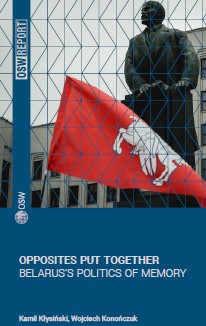Opposites Put Together. Belarus’s Politics of Memory
Opposites Put Together. Belarus’s Politics of Memory
Author(s): Wojciech Konończuk, Kamil Kłysiński
Subject(s): Political history, Government/Political systems, Comparative politics, Transformation Period (1990 - 2010), Present Times (2010 - today), Politics of History/Memory, Politics and Identity
Published by: OSW Ośrodek Studiów Wschodnich im. Marka Karpia
Keywords: Belarus; Politics of Memory; Historical identity; Pro-Russian drift; Polotsk; Grand Duchy of Lithuania; Second Polish Republic;
Summary/Abstract: Immediately after 1991, the activity of nationalist circles in Belarus led to a change in the Soviet historical narrative, which used to be the only permitted one. However, they did not manage to develop a coherent and effective politics of memory or to subsequently put this new message across to the public. The modest achievements of the first few years of independence were wasted after Alyaksandr Lukashenka came to power. He ordered a return to the Soviet vision of history that was only slightly modified. The Byelorussian Soviet Socialist Republic (BSSR), recognised as the first Belarusian state in history, still remained its pivot. It was only at the dawn of the new century that the regime, which had radically dissociated itself from the national narrative, began to see a need for conducting a politics of memory that would not only be based on the Soviet legacy, but also on earlier periods of Belarusian history. In Belarus, governed as it is by an authoritarian regime, the politics of memory is determined primarily by the Presidential Administration, which in fact has a monopoly on shaping it. Neither the opposition, which is weak and fragmented, nor independent historians have a real say in formulating the message addressed to the citizens.
Series: OSW Reports
- E-ISBN-13: 978-83-65827-56-2
- Print-ISBN-13: 978-83-65827-56-2
- Page Count: 68
- Publication Year: 2020
- Language: English
- eBook-PDF
- Table of Content
- Introduction

